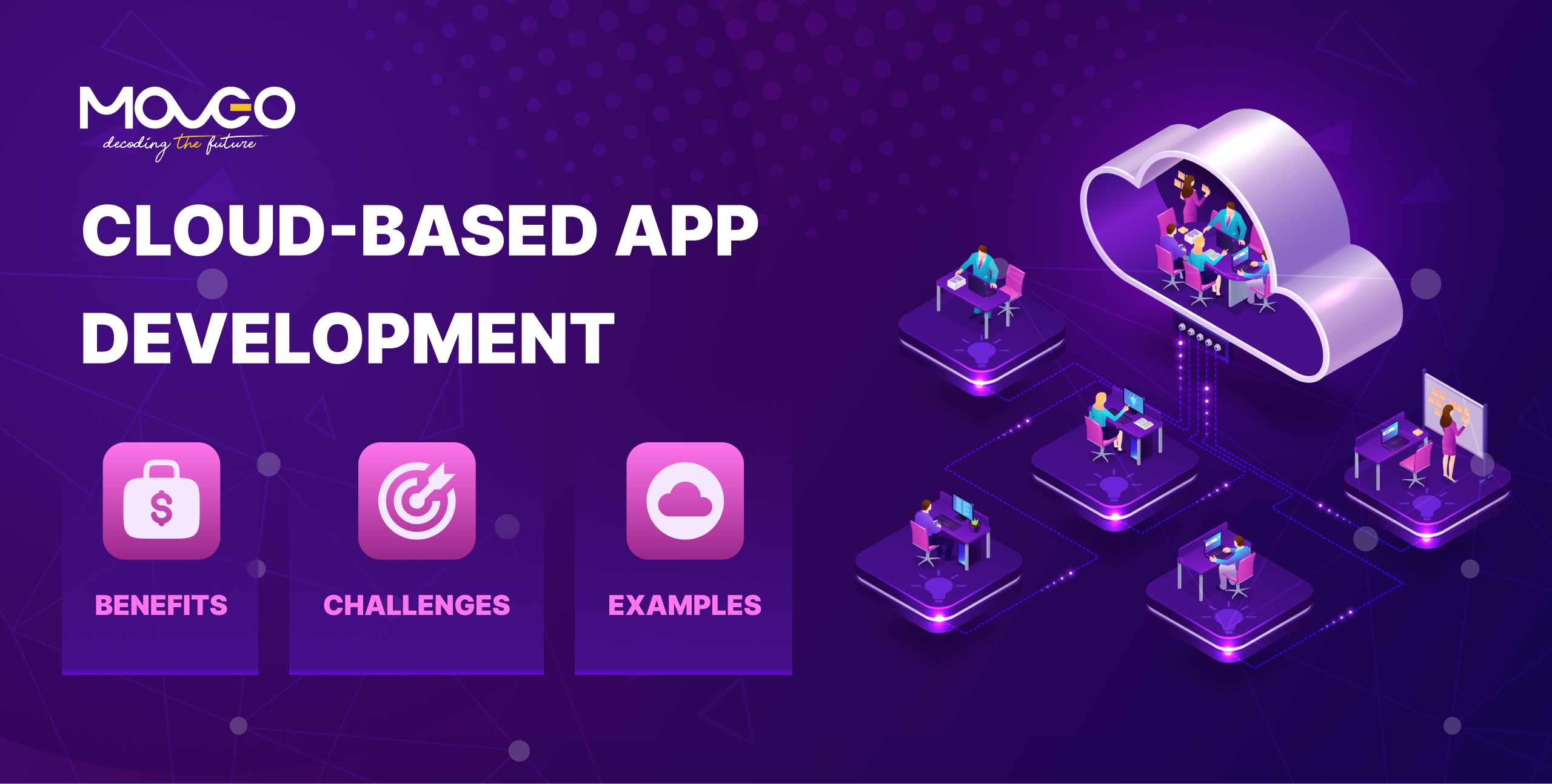Cloud computing has revolutionized the way businesses develop and deploy applications. While all business small and large realize the importance of having a mobile app working for them, most report that server, storage, and hardware are sizeable expenses. Startups and small businesses working on limited budgets need a cost-effective solution to app development.
With cloud-based app development, businesses can access these services and tools on-demand, without having to invest in costly infrastructure and hardware, making it an ideal choice for app development, which requires scalability, flexibility, and cost-effectiveness.
In this post, we will explore the role of cloud computing in app development by showcasing real-world examples of companies that have successfully leveraged cloud computing to build and deploy their applications. We will also discuss the benefits of cloud computing for app development and the challenges that companies may face when adopting cloud computing.
What is cloud computing?
Cloud computing is a model for delivering computing resources, such as servers, storage, and applications, over the internet. It involves a network of remote servers hosted on the internet to store, manage, and process data, rather than a local server or a personal computer. This allows businesses to access computing resources on demand and scale them up or down as needed, without having to invest in or maintain their own IT infrastructure.
Cloud computing is typically offered as a service by cloud providers, who manage the underlying infrastructure, security, and maintenance, while users access the resources through a web browser or software application.
In the context of app development, Cloud-based app development provides businesses with a more efficient and cost-effective approach to building applications. It enables businesses to scale their infrastructure as per the demand, access applications from anywhere and ensure data security, all of which can ultimately enhance their overall competitiveness.
Let’s understand this with an analogy.
Think of cloud computing like renting a car. When you rent a car, you pay for the car for a certain amount of time, but you don’t have to worry about things like maintenance, insurance, or repairs. You can use the car for as long as you need it, and then return it when you’re done.
Similarly, with cloud computing, you rent computing resources from a cloud provider, like servers or storage, for a certain amount of time. You can use these resources for as long as you need them, and then return them when you’re done. The cloud provider takes care of things like maintenance, security, and upgrades, so you don’t have to worry about them.
Just like renting a car can be more cost-effective than buying one, renting computing resources from a cloud provider can be more cost-effective than investing in your own IT infrastructure.
Benefits of Cloud Computing for App Development
For startups and businesses striving for maximum efficiency in rationed resources, cloud computing offers remarkable benefits for app development.
Scalability
With cloud computing, businesses can easily scale their infrastructure up or down to meet changing demands. This is particularly important for app development, which may experience sudden spikes in traffic or usage at specific times.
For example, an e-commerce app may experience a surge in traffic during holiday seasons, or a finance app may need to process a large number of transactions at the end of a fiscal year.
With cloud computing, businesses can easily increase their computing resources during these peak periods, and then scale them back down when demand returns to normal. This means they only pay for the resources they need when they need them.
Flexibility
With cloud computing, businesses can quickly spin up new instances of their applications or services, which can be beneficial for testing and experimentation. Cloud computing also allows businesses to easily deploy their applications across multiple regions or data centers, which can improve performance and reduce latency.
Cloud computing also allows businesses to quickly launch new apps or services, without having to worry about the underlying IT infrastructure, which can be time-consuming and costly to set up and manage.
Reduce costs
By eliminating the need for costly infrastructure and hardware, cloud computing helps businesses reduce cost drastically. Businesses can access a range of services and tools on-demand, including server, storage, and networking resources, without having to invest in expensive hardware. This can be particularly beneficial for small and medium-sized businesses that may not have the resources to invest in their own infrastructure.
Real-World Examples of Cloud-Based App Development
Netflix
Netflix is today worth more than $150 billion! It is one of the biggest users of cloud computing for app development. Netflix uses Amazon Web Services (AWS) to build its video streaming service since 2008. By leveraging the cloud, Netflix has been able to rapidly scale its service to millions of users around the world without incurring high infrastructure costs.
Netflix accounts for more than 35% of all downstream traffic in the U.S. It also stores 12 TB (or 12,000 GB) of data per hour per customer account—that’s several years’ worth of video! That’s enormous, and yet, it only takes up under 0.5% of server space on AWS. (Source)
One of the key benefits of cloud computing for Netflix has been its ability to scale up or down on-demand. When Netflix releases a new series or movie, it can experience a sudden spike in traffic. With cloud computing, Netflix can easily scale up its infrastructure to meet this demand.
Airbnb
Airbnb is another company that has successfully leveraged cloud computing for app development. Airbnb uses a few different AWS services like EC2, ElasticCache, DynamoDB, RDS, S3, and more to stay agile. Airbnb has been able to build a powerhouse system to serve millions of guests in 25,000 cities spanning 192 countries in 5 years. Only with cloud computing were Airbnb able to to overcome the complex machinery of hospitality industry.
Challenges of Cloud-Based App Development
While cloud computing offers many benefits for app development, there are also challenges that companies may face when adopting cloud computing.
Security
One of the key challenges businesses face with cloud computing is security. Businesses must ensure that their data is secure and protected from unauthorized access. This requires implementing robust security measures and protocols, such as encryption and access control.
It’s important for businesses to work closely with their cloud provider and internal security teams to ensure that all security measures like multi-factor authentication, regularly monitoring and auditing, access control and identity management systems, firewalls, intrusion detection, and regular security assessments, are properly implemented and maintained.
Vendor Lock-in
Another challenge of cloud-based app development is vendor lock-in. When a business relies heavily on a single cloud provider for its infrastructure, it can be difficult to switch to another provider if necessary. This can limit a business’s flexibility and may result in higher costs if they are unable to negotiate favorable pricing.
Complexity
In addition to security challenges, businesses may also struggle with managing the complexity of their cloud infrastructure. The availability of a vast range of services and tools in cloud computing can make it difficult for businesses to keep track of their resources and usage. Without proper management and monitoring, businesses may end up with unused resources or duplicate services, leading to increased costs and inefficiencies.
To address this challenge, businesses can implement cloud management tools and services that provide visibility into their cloud environment, help track usage and costs, and optimize resource allocation.
Compatibility with existing systems
Another challenge is ensuring seamless compatibility between the cloud and the existing on-premises systems. Businesses can use integration tools and services that streamline the integration process and provide seamless connectivity between their cloud and on-premises systems. By properly integrating their cloud-based applications, businesses can maximize their return on investment and gain a competitive advantage in their industry.
Conclusion
Cloud computing has become an integral part of app development, offering scalability, flexibility, and cost-effectiveness. Real-world examples from companies like Netflix and Airbnb have demonstrated the benefits of cloud computing for app development, including the ability to rapidly scale up or down, innovate quickly, and deploy applications globally. If you’ve been wondering how much it would cost to develop an app, contact us today to find out how you can save cost and maximize efficiency with cloud based app development for business.


